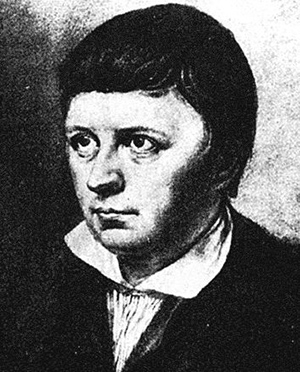
Karl Wilhelm Friedrich (after 1814: von) Schlegel (March 10, 1772 – January 12, 1829) was a German poet, literary critic, philosopher, philologist and indologist. With his older brother, August Wilhelm Schlegel, he was one of the main figures of the Jena romantics. He was a zealous promoter of the Romantic movement and inspired Samuel Taylor Coleridge, Adam Mickiewicz and Kazimierz Brodzinski. Schlegel was a pioneer in Indo-European studies, comparative linguistics, in what became known as Grimm's law, and morphological typology. As a young man he was an atheist, a radical, and an individualist. Ten years later, the same Schlegel converted to Catholicism. Around 1810 he was a diplomat and journalist in the service of Metternich, surrounded by monks and pious men of society. (Click here for full Wikipedia article)
-----
A critic is a reader who ruminates. Thus, he should have more than one stomach.
A family can develop only with a loving woman as its center.
A so-called happy marriage corresponds to love as a correct poem to an improvised song.
About no subject is there less philosophizing than about philosophy.
All men are somewhat ridiculous and grotesque, just because they are men; and in this respect artists might well be regarded as man multiplied by two. So it is, was, and shall be.
An aphorism ought to be entirely isolated from the surrounding world like a little work of art and complete in itself like a hedgehog.
Aphorisms are the true form of the universal philosophy.
Art and works of art do not make an artist; sense and enthusiasm and instinct do.
As the ancient commander addressed his soldiers before battle, so should the moralist speak to men in the struggle of the era.
Beauty is that which is simultaneously attractive and sublime.
Combine the extremes, and you will have the true center.
Considered subjectively, philosophy always begins in the middle, like an epic poem.
Every uneducated person is a caricature of himself.
He who does not become familiar with nature through love will never know her.
He who has religion will speak poetry. But philosophy is the tool with which to seek and discover religion.
In true prose everything must be underlined.
Irony is a clear consciousness of an eternal agility, of the infinitely abundant chaos.
Irony is the form of paradox. Paradox is what is good and great at the same time.
It is as deadly for a mind to have a system as to have none. Therefore it will have to decide to combine both.
Many a witty inspiration is like the surprising reunion of befriended thoughts after a long separation.
Mathematics is, as it were, a sensuous logic, and relates to philosophy as do the arts, music, and plastic art to poetry.
Mysteries are feminine; they like to veil themselves but still want to be seen and divined.
One can only become a philosopher, but not be one. As one believes he is a philosopher, he stops being one.
Publication is to thinking as childbirth is to the first kiss.
Reason is mechanical, wit chemical, and genius organic spirit.
Religion is absolutely unfathomable. Always and everywhere one can dig more deeply into infinities.
The essential point of view of Christianity is sin.
The historian is a prophet looking backward.
The main thing is to know something and to say it.
What is called good society is usually nothing but a mosaic of polished caricatures.
When reason and unreason come into contact, an electrical shock occurs. This is called polemics.
Where there is politics or economics, there is no morality.
Wit as an instrument of revenge is as infamous as art is as a means of sensual titillation.
Wit is an explosion of the compound spirit.
Wit is the appearance, the external flash of imagination. Thus its divinity, and the witty character of mysticism.
Women do not have as great a need for poetry because their own essence is poetry.
-----
(March 10 is also the birthday of Clare Boothe Luce.)
Categories: Karl Wilhelm Friedrich Schlegel, Quotes of the day
Home KGB on Bluesky KGB on Substack
KGB Stuff Commentwear E-Mail KGB
Donate via PayPal

















